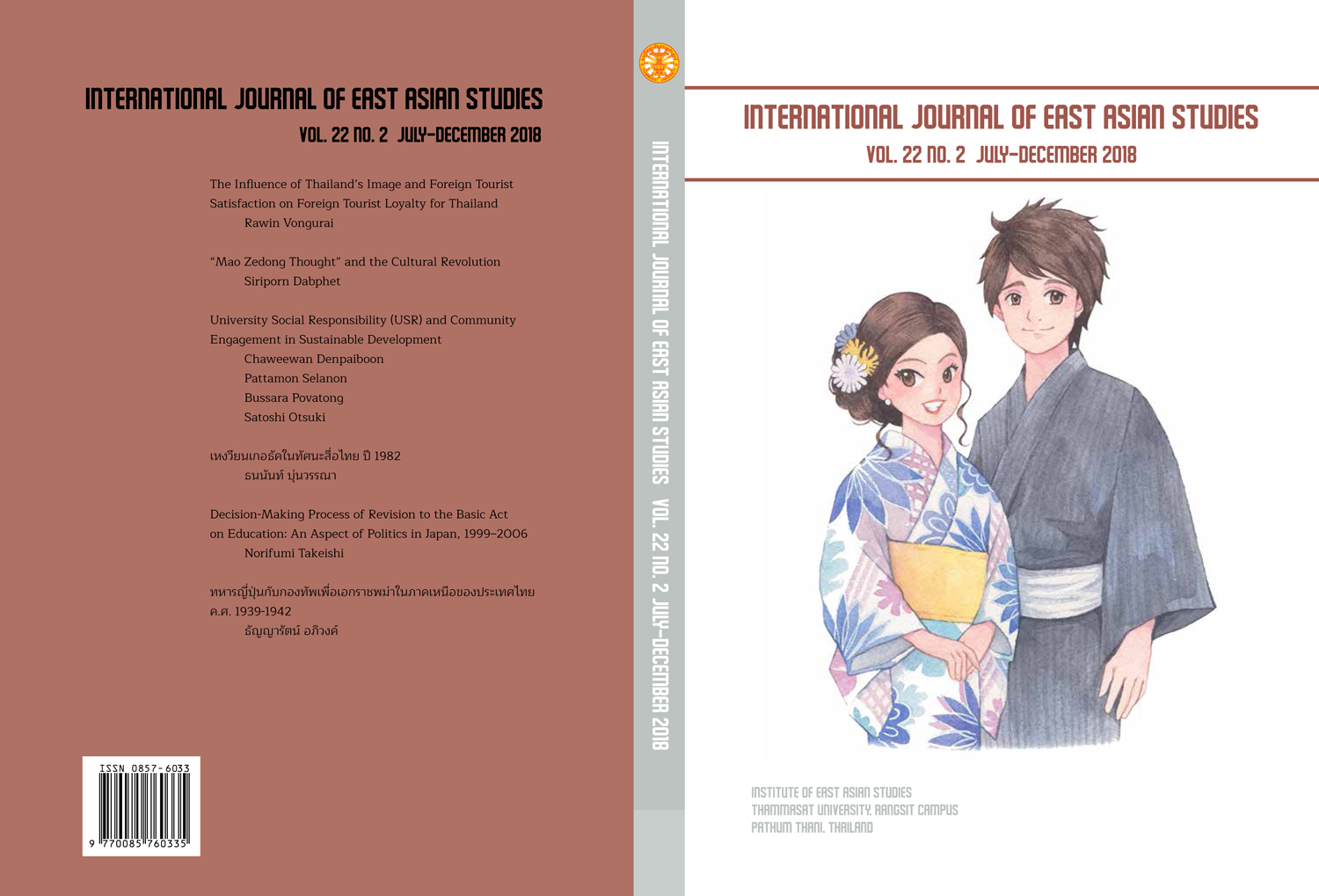“Mao Zedong Thought” and the Cultural Revolution
Keywords:
Mao Zedong Thought, China, Cultural Revolution, conflict theory, mass mobilizationAbstract
This study examines “Mao Zedong Thought” in leading the Chinese Communist Party, China, and the Thought that led to the eruption of the Cultural Revolution in 1966 and its impacts. It is found that Mao Zedong Thought was mainly developed from Marxism-Leninism, his background and experience. The key elements of Mao Zedong Thought are Marxist revolution, the importance of the peasants, mass mobilization and voluntarism, continuous revolution, proletarian revolution, self-criticism, class struggle, and the primacy of Mao Zedong Thought. He was also interested in employing conflict theory to change culture and socio-political system of China. Campaigns launched under Maoist ideology had an important and serious impact on China and Chinese people. Reasons for the Cultural Revolution, erupted in 1966, are quite complex. For Mao, it is as an ideal of social transformation and his response to revisionism that threatened his thought of social equality and class struggle. Although purging the Party leaders, condemned as revisionists, was his personal reason, it was the Thought on continuous revolution and mobilizing the masses. The Cultural Revolution went beyond the stage of historical development and failed to lead effectively. It greatly impacted on various parts of China and changed the Chinese people’s world outlook and values.
References
Cheng, N. (1987). Life and death in Shanghai. New York: Penguin Book.
Jung, C. (1991). Wild swans: Three daughters of China. London: Harper Collins.
Cohen, P. S. (1970). Modern social theory. London: Heinemann.
Crook, F. W. (1973). Collective farms in Communist China. Monthly Labor Review, 96(3), 45-50.
Dikötter, F. (2016). The Cultural Revolution: A people history 1962-1976. London: Bloomsbury.
Fairbank, J. K. (1998). China: A new history. Cambridge, Mass: Harvard University Press.
Gray, J. (2002). Rebellions and revolutions: China from 1800s to 2000. New York: Oxford University Press.
Fitzpatrick, S. (1974). Cultural Revolution in Russia 1928-32. Journal of Contemporary History, 9(1), 33-52. https://doi.org/10.1177/002200947400900103
MacFarquhar, R. (2011). The origins of the Cultural Revolution (Vol. 3). doi: 10.1093/acprof:oso/9780192149978.001.0001
MacFarquhar, R. (Ed.). (2011). The politics of China: Sixty years of the People's Republic of China (3rd ed.). New York: Cambridge University Press.
MacFarquhar, R., & Schoenhals, M. (2006). Mao's last revolution. Cambridge, Mass.: Harvard University Press.
Maheshwari, V. K. (2016). The concept of social change. Retrieved from https://www.vkmaheshwari.com/WP/?p=2163
Mao, Z. (1966). Four essays on philosophy. Peking: Foreign Language Press.
Mao, Z. (1945). On Coalition Government. Retrieved from https://www.marxists.org/reference/archive/mao/selected-works/volume3/mswv3_ 25.htm
Mao, Z. (1943). Inscription for a production exhibition sponsored by organizations directly under the Central Committee of the Party and the General Headquarters of the Eighth Route Army, Liberation Daily of Yenan. Retrieved from https://www.marxists.org/reference/archive/mao/works/red-book/ch11.htm
Mao, Z. (1941). Preface and Postscript to Rural Surveys. Retrieved from https://www.marxists.org/reference/archive/mao/selected-works/volume- 3/mswv3_01.htm
Mao, Z. (1927). Mao Zedong on the Peasant Revolution in Hunan (1927). Retrieved from https://alphahistory.com/chineserevolution/chinese-revolution-documents/
Maoist Documentation Project. (2000). Mao Tse-tung on Guerrilla Warfare. Retrieved from Mao Tse-tung Reference Archive website: https://www.marxists.org/reference/archive/mao/works/1937/guerrilla-warfare/
Meisner, M. J. (1999). Mao's China and after: a history of the People's Republic (3rd ed.). New York: Free Press.
Milner, G. (2009). China: Youth and the Cultural Revolution. LINKS: International journal of socialist renewal. Retrieved from https://links.org.au/node/1326
Plänkers, T. (2011). Psychic impact and outcome of the Chinese Cultural Revolution (1966-1976): A psychoanalytic research project at the Sigmund Freud Institute, Frankfurt (Germany). International Journal of Applied Psychoanalytic Studies, 8(3), 227-238.
Richards, S. & Saba, P. (Eds.). (1986). The Theory and Practice of Mao. Retrieved from https://www.marxists.org/history/erol/uk.hightide/mao.htm
Sheng, M. M. (2006). Mao Zedong and the Three-Anti campaign (November 1951 to April 1952): A Revisionist interpretation. Twentieth-Century China, 32(1), 56-80.
Spence, J. D. (2013). The search for modern China (3nd ed.). New York: W.W. Norton.
Stalin, J. V. (1954). Concerning question of Stalin. Moscow: Foreign Languages Publishing House.
Selden, M. (2016). The political economy of Chinese development. London: Routledge.
Suettinger, R. L. (2017). Negotiating history: The Chinese Communist Party’s1981. Retrieved from https://project2049.net/2017/07/17/negotiating-history-the-chinese-communist-partys-1981/
Terrill, R. (1971). The 800 Million: Report from China. New York: Delta Books.
The Compilation Group for the “History” of Modern China” Series. (1976). The revolution of 1911. Retrieved from https://indiachinainstitute.org/wp.../the-opium-war-beijing-foreign-language-press.pdf
Werner, J. (1979). Beat back the dogmato-revisionist attack on Mao Tsetung Thought. Retrieved from https://www.marxists.org/history/erol/ncm-5/rcp-hoxha/index.htm
Wustenberg, W. (1979). The education of the future: An introduction to the theory and practice of socialist education. London: Pluto Press.


